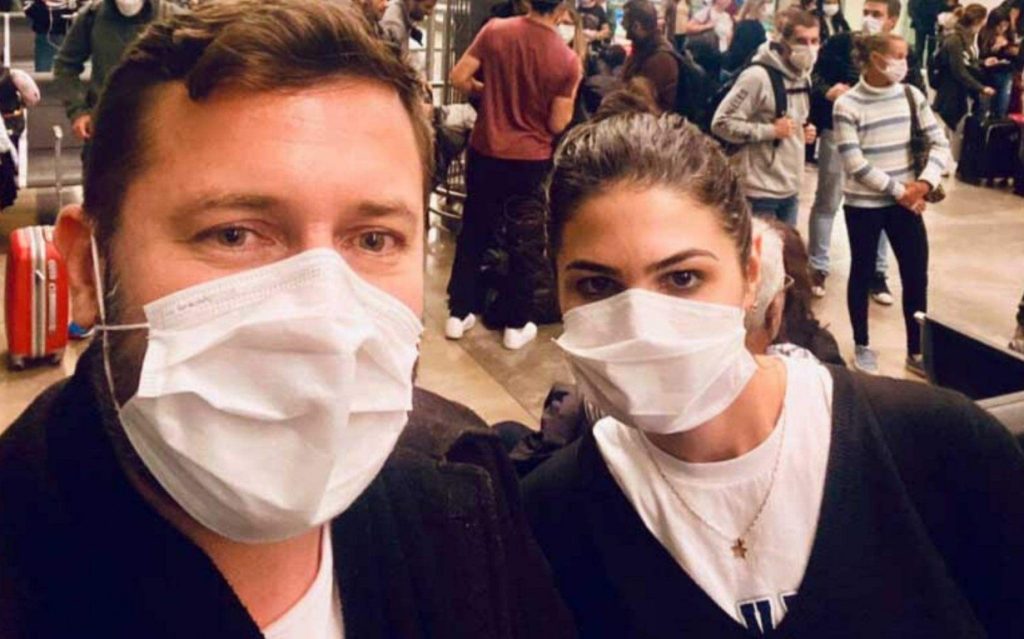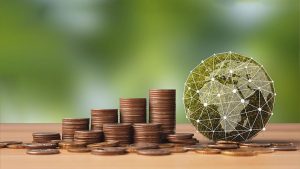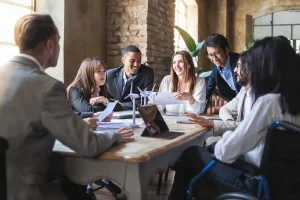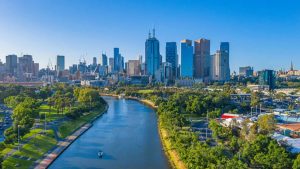
Interview: COVID-19 Recovered Couple Speak Out On How They Survived Coronavirus
The outbreak of coronavirus has diagnosed more than a million patients worldwide. Soon the number of cases are going to exceed two million in the coming days.
It is estimated that the coronavirus is going to affect 60& to 80% of the total population of the world, but again, these are just estimates as nothing can be predicted in this time of uncertainty. We don’t know to what extent national restrictions, which vary wildly across the globe, will prevent or delay infections and deaths. Even the official coronavirus death tolls are only the estimates.
We are living in a time of uncertainty and it is the time how we as an individual and society, stand up and support each other in this time of crisis
We had an interview with a couple who were amongst the first COVID-19 recovered patients in Brazil, giving us insights on how real is the problem and why we should take ourselves seriously- physically, mentally and emotionally.
João and Jaqueline at Orly airport, Paris during their trip to Europe. Picture Credits: João Ricardo Schneider
João Ricardo Schneider from Brazil, Executive Secretary Paraná’s Partnership Council in the Paraná State Government and his wife Jaqueline Fracaro, a biochemistry pharmacist, also involved in testing of COVID-19 patients, who were also diagnosed with COVID-19 share their experience of dealing with this infectious disease and how was their journey towards the recovery
Q. What were the symptoms you experienced when you were diagnosed with COVID-19?
João: My wife and I were in Europe at the beginning of March and we had to hurry back, as Latin America’s airspace was being closed down quickly. We contracted the disease at some point during our days between Spain, France and Luxembourg.
During the trip we already had the first symptoms. As we were attentive and knew the seriousness of the situation, even before taking any exam, we decided to return to Brazil considering ourselves sick, taking all possible precautions. We did the exam that confirmed that we had COVID-19 only three days after our return to Brazil.
During the trip, the first symptoms that we had, which called our attention that something was not right were: in my case, a strong irritation in the eyes (a kind of conjunctivitis), diarrhoea, severe sore throat and a runny nose; my wife only had a sore throat and a runny nose. The sore throat resembled the one we have when we sleep with strong air conditioning.
As soon as we arrived in Brazil, our pictures were different. My wife had only mild symptoms, only experiencing a dry cough, pain throughout her body, weakness and low fever for the next 10 days
But my symptoms started to evolve. In addition to all that she had, the irritation in my throat became an irritation in the chest, in the lung. I started having a long, very ugly and dry cough.
I started to have, in some moments, very sharp pains in my chest, which I had never felt before. And the worst of the disease: I started to feel my lung compromised. Every time I coughed, when I tried to breathe afterwards, the air didn’t come, as if I had a glue-filled lung.
When I tried to force my breath, my lungs made a very loud hiss, audible even to other people. The doctors treated me at home and luckily I didn’t have to go to the hospital.
The main criteria for defining who should be hospitalized and who can stay at home is the blood oxygenation level. As mine remained stable even during the acute phase of the disease, I was able to stay at home.
After the symptoms of the acute phase passed, we both continued to have weakness and pain in the body for a few more days, and another symptom emerged that I consider very characteristic of our condition; we were for a few days without any smell, even with the nose totally unobstructed.
It is a strange sensation, but for me, in addition to a sore throat, dry cough and shortness of breath, these are the clearest symptoms for someone to know if they have the disease or just have a common flu.
Q. Since you both were diagnosed, how did you manage and support each other at home?
Jaqueline: Generally, our coexistence is very calm, so we had no problem staying the month together, and alone, in quarantine. We arrived from the trip and already put ourselves as sick, even before the exams.
João’s result came out well before, because he had symptoms before. So, in the beginning I helped him as much as I could: he helped when he was short of breath, made food, took care of things and made a lot of tea for him, because it was what calmed his dry cough the most.
We try to distract ourselves as much as possible, avoiding all day in front of the TV watching the dead counts, which only increased his anxiety and hindered his recovery. We saw a lot of TV shows and cooked a lot, which we love to do together.
When my symptoms appeared and my diagnosis came out, he was already better, then it was his turn to take care of me. My symptoms were milder than his, but I also needed attention.
João suggests indulging some time in leisure activities helps to relieve mental stress. Picture Credits: João Ricardo Schneider
Q. Glad that you two are doing well now. How was the medical support and treatment overall? Was the treatment different for you and your wife?
João: In Brazil, it has already become a political dispute, as the president openly defends hydroxychloroquine as the cure for covid-19, even though science has not yet concluded it. The truth is that everything is very new and the history of this disease is still being written, so there is still no consensus about its characteristics and treatment, even among doctors.
In our case, as the first exams here in Brazil were still taking many days, the result of the confirmation of the covid-19 only arrived seven days after the material was collected. Until then, we were treated as if it were a conventional flu, in her case, and a beginning of pneumonia in mine. Our doctor initially, as a precaution, gave us tamiflu, a remedy for H1N1. So, we go through the acute phase of the disease without specific treatment.
What helped me most during these difficult days (and what I am recommending to everyone who feels the symptoms) is a lot of rest, turning off the television (because the amount of bad news increases our anxiety and makes us very worried, which compromises our improvement) and lots of hot tea.
I realized that a very hot drink greatly calmed irritation and coughing and, consequently, shortness of breath. I had a tea that is very common here in Brazil: chamomile tea, which my wife made with honey, lemon and ginger.
Obviously, this suggestion is not a medical advice, but a personal tip from those who have had the disease.
Jaqueline gets medical assistance and check-up at home in Brazil. Picture Credits: João Ricardo Schneider
Q.Since you are a biochemistry pharmacist, how was it like to go back to work after being diagnosed?
Jaqueline: My return to work left me at first unsure. As we were the first confirmed cases in our city, João’s name circulated in the city, many people were afraid, commenting and obviously, they called us to my laboratory.
When I was discharged, I talked to several colleagues in the health field to have the greatest possible guarantee that I was no longer at risk of transmitting COVID-19 to anyone, especially to the other professionals who work with me.
On the way back, I took care of hygiene because I was very insecure. I was also concerned that the case could, in some way, damage the image of my laboratory in the city, as it is small (about 55 thousand inhabitants) and I was afraid that this would hinder our activities.
But that damage did not occur. People came to talk to me, asking about the disease and its symptoms, but more in a tone of curiosity, because here in Brazil it is still very common to find people who do not believe in the seriousness of the situation.
To my surprise, we received a lot of support.
João gets medical treatment and assistance at home by the medical professionals. Picture Credits: João Ricardo Schneider
Q. As the effect of coronavirus is different from person to person, the fear of unknown creeps in because there are cases where even young people with no serious health issues have died. How did you mentally prepare yourself during this hard time?
João: I have been reasoning with myself for some years in my life: some things I do because I want to, and others I do because I need to. Neither I nor anyone would have imagined (with the exception perhaps of infectologists, who warned of the risk) that this pandemic would change the world so quickly.
But I also have the personal conviction that we do not experience life by chance. My life brought me right to the place where I was at that time. I was not reckless, irresponsible or intended to be sick. So, the only thing I had left was to go through the experience in the best way possible and taking the best lessons I could.
Q. What precautions did you take after recovery? Do you feel any changes personally?
Jaqueline: Regarding my personal changes, it is undeniable that health and hygiene care has increased. In the midst of a crisis, only the personal care of each person can slow down the speed of proliferation of the epidemic. In addition, as a health professional in our city, I am concerned about our population.
I try to clarify how much I can help people to take care of themselves, as they can. Finally, I am eager to help everyone, as I know how hard the disease is. We are even trying to donate our blood plasma to help with research, as there is some chance that it will help, especially in critically ill patients.
Jacqueline is a biochemistry pharmacist who is also involved in testing for coronavirus diagnosed patients. Picture Credits: João Ricardo Schneider
Q. Since you were diagnosed and now that you’re associated with conducting tests for COVID-19, what are some tips and suggestions you’d like to give to the audience?
Jaqueline: As our case was the first here in the city, we are trying, as far as possible, to use our example to make the population understand what is happening and take care of themselves. Whenever we can we talk about the symptoms and the necessary care, stressing that this is all very serious.
If everyone gets sick at the same time, many hospital beds will be missing. The proliferation of the disease is very fast, if we do not take proper care. And once infected, their evolution can occur very quickly, with unpredictable consequences.
We ask that everyone continue to take care, insofar as possible maintaining their isolation, and not to self-medicate. If you experience any of the symptoms, seek the nearest health authorities. This can help save you, your family and your community
Another important thing I already mentioned in the previous question: if you get sick, don’t watch the daily update of the number of deaths on TV. It messes with our head. Rest, drink plenty of fluids, spend time reading, reflecting, making video conferences with those you love. In short, try to help in your improvement, not in getting worse.
Just like João and Jaqueline, there are many families who have struggled and fought COVID-19, and paving their way towards recovery. Earth5R understands that one of the most important defences that our society can have is improving our immune systems and practicing self-sustainability as much as possible. Taking preventive measures to stop the spread of coronavirus is as much as important to make ourselves sustainable.
ABOUT EARTH5R
Earth5R has taken up the initiative to compile true and evident-based information in one training, which contains all the information required to keep people aware, responsive and self-sustainable against this global pandemic. We are looking forward to working with governments, companies and International organisations to help us fund this training, in order to upscale this initiative at a global level. Interested can reach out to Earth5R via email or call/ whatsapp us at +91 9920045587.
Earth5R is a global sustainability based organization from India with its head office at Mumbai. It works with the NGO sector, Companies and helps them conduct environmental corporate social responsibility (CSR) programs Earth5R has launched various initiatives to combat COVID-19 (Coronavirus). Earth5R has the following services to support COVID response: Telemedicine, PPE equipment, Building isolation rooms, Disinfectant and thermal screening tunnel, COVID Trainings on Awareness, Response & Self Sustainability
– Interview conducted by Anu Chaudhari, Earth5R




